Summary
Occasional updates and analysis from the Newsnight team
Live Reporting
Sadiq Khan speakspublished at 11:20
Corbyn to win big?published at 11:19
11:19Tweets from the teampublished at 11:18
11:18Tom Watson to be elected Deputy Leader?published at 11:16
11:16Tweets from the teampublished at 11:16
11:16Transfer deadlinepublished at 11:03
11:03Will non-transferred votes be crucial?
 Marc Williams
Marc Williams
Newsnight Election ProducerAs it stands, nobody is thinking that this race is going to be particularly close. If it is, however, then the transfer of votes from candidates who are eliminated will become crucial.
In the Labour London candidate election yesterday, 8935 votes were not transferred by the time it came to the run-off between Sadiq Khan and Tessa Jowell. This was nearly 10% of the total.
If this is repeated in half an hour, then this could have a material effect on who wins. Unless, of course, a candidate gets over 50% in the first round.
The Labour Leadership race in four chartspublished at 10:38
10:38 Marc Williams
Marc Williams
Newsnight Election ProducerAs the saying goes you never seek a poor bookie. If that's the case, then Jeremy Corbyn will shortly be declared Labour Party leader.
A perfect way of illustrating this is to look at the chart showing implied probability of winning and volume of bets on Betfair, the betting exchange.
LIZ KENDALL
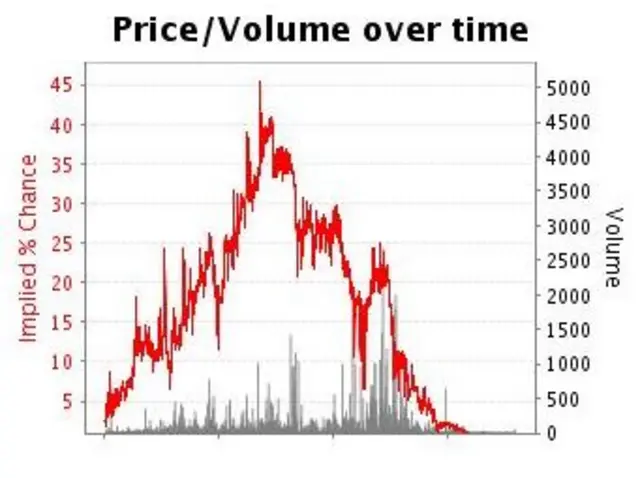 Image source, Betfair
Image source, BetfairANDY BURNHAM
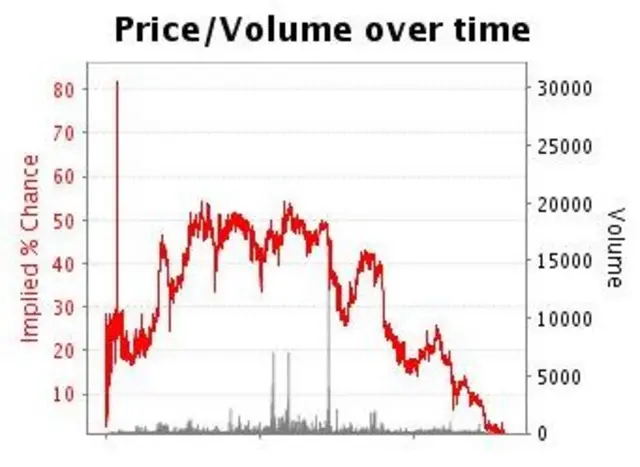 Image source, Betfair
Image source, BetfairYVETTE COOPER
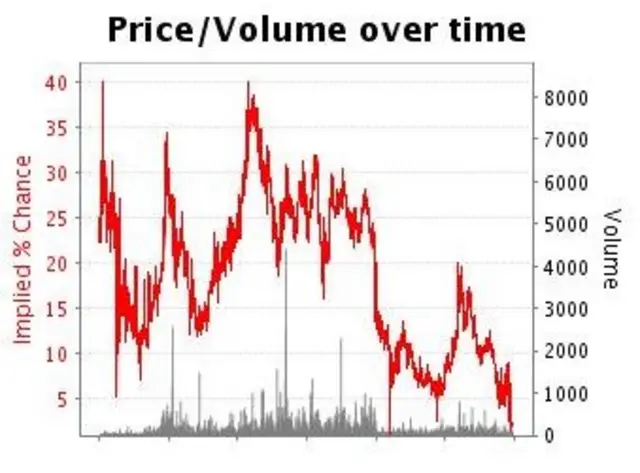 Image source, Betfair
Image source, BetfairJEREMY CORBYN
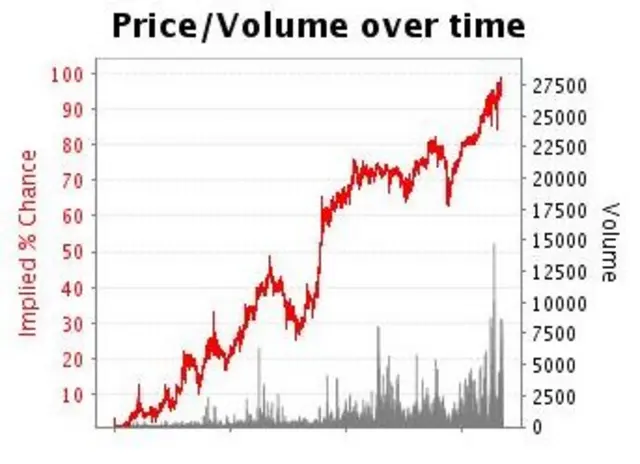 Image source, Betfair
Image source, BetfairSo, Liz Kendall had an implied chance of winning at over 45% at one stage. Andy Burnham was at over 80% at one point. Yvette Cooper was at 40%.
But look at that Corbyn steamroller, going from close to 0% to the end point today of (effectively) 100%.
Incidentally, over £3 million has been staked on this election at Betfair.
The view from the QEIIpublished at 10:43
10:43 Allegra Stratton
Allegra Stratton
Newsnight Political EditorMorning. Myself and Newsnight's programme editors Imogen Walford and Jess Brammar are at the Queen Elizabeth II centre this morning to watch Labour find out who its 18th leader is.
Some in Labour are reeling from the mayoral result yesterday - the scale of Tessa Jowell's defeat yesterday has shocked the people who used to run Labour, and the country, to the core. One senior figure believes what is happening to Labour is a "catastrophe". The large margin - 41% to Sadiq Khan 59% was not seen coming. If Jeremy Corbyn's win is also by such a large margin, it gives him a large mandate too. His opponents had hoped it would be a small margin and so limiting his scope for manoeuvre as leader. So we wait to see the scale of his victory.
Others will feel another new different dawn has broken - including a lady I was chatting to near my house (it is a Saturday, after all, and even us political journalists have things to do before heading to conference centres across the land...) said their 23 year old had voted Corbyn, interested by this election for the first time ever. Into this mix will come the deputy leader - the first announcement this morning. A figure who feels he has to hold the two factions - old New Labour and new Old Labour, if you like - together. That is likely to be Tom Watson but again, let's wait and see. Watson gave a speech this week that is worth a second look - apparently he used it as his last chance to put down a marker of his red lines before this weekend when he is elected and will have to be loyal ie keep schtum. The speech is here - he makes it clear that internally he will fight to defend Labour's historic military and foreign affairs traditions... That means he'll stop Corbyn taking the UK out of NATO. And he'll oppose any plans for mandatory deselection.
No more Punch & Judy politics?published at 10:21
10:21Could Jeremy Corbyn as leader succeed where others have failed?
 Marc Williams
Marc Williams
Newsnight Election Producer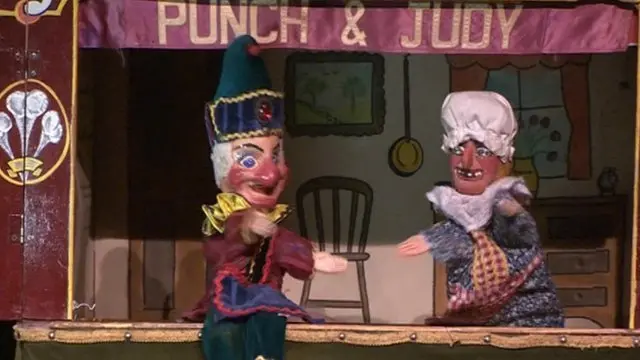
Ahead of an election result where most expect him to come out on top, Jeremy Corbyn has been setting out the style of leadership that he wants to adopt.
He has said, external: "Fundamentally many people are turned off by a political process when the major parties are not saying anything different enough about how we run the economy, and totally turned off by a style of politics which seems to rely on the levels of clubhouse theatrical abuse that you can throw across at each other in parliament and across the airwaves."
But some of you might be getting a slight touch of deja vu. Cast your minds back to December 2005. In his acceptance speech to be Tory leader, David Cameron said:
"And we need to change, and we will change, the way we behave. I'm fed up with the Punch and Judy politics of Westminster, the name calling, backbiting, point scoring, finger pointing."
And what about this, from new Prime Minister Gordon Brown in June 2008:
"And this need for change cannot be met by the old politics so I will reach out beyond narrow party interest; I will build a government that uses all the talents; I will invite men and women of goodwill to contribute their energies in a new spirit of public service to make our nation what it can be."
Or Ed Miliband's first speech as Labour leader in September 2010:
"I stand here today ready to lead: a new generation now leading Labour. Be in no doubt.The new generation of Labour is different. Different attitudes, different ideas, different ways of doing politics."
It would be a quick job to find other such statements from other leaders over the years. The point is that no new leader has ever made a speech standing up for the "old way of doing politics" and no new leader has ever made a speech where he says that they want to "continue the factionalism and partisanship of the past."
The problem is that most leaders find it hard to turn that aspiration (even when it is genuine) into reality. David Cameron freely admits that he completely failed in his attempt to abandon "Punch and Judy": indeed, he is one of the most practiced exponents of it in PMQs. Gordon Brown's attempt at a new politics was sunk in the mire of MPs' expenses. Ed Miliband wanted to lead a "New Generation" but was sunk partly by his own association with the past.
And then there is the party morale bit. Partisan politics may play badly with the electorate but it is deemed essential to keep your own MPs on side. Given the lack of support among MPs that Mr Corbyn has, perhaps his is the best strategy. But week after week of sober performance at the Dispatch Box can contribute to a sense that a leader is under-performing. Iain Duncan Smith tried to make a virtue of this by trying to establish a "Quiet Man" persona. It did not end well for him.
The question is: would Mr Corbyn break the mould of modern politics and demonstrate that an unshowy, sincere expression on ideas can win people over or would he find out, as others have before him, that image, presentation and showmanship are now essential elements of modern political leadership?
After the election, the honeymoon?published at 10:35
10:35 Marc Williams
Marc Williams
Newsnight Election ProducerIn case you missed it, earlier in the week I took a look at the honeymoons that other Leaders of the Opposition enjoyed and a few lessons for today's victor.
More here
The plan for the daypublished at 10:17 BST 12 September 2015
10:17 BST 12 September 2015Welcome to Newsnight Live's Labour leadership special.
Here's a outline of what will happen this morning:
- 11:00 Special leadership conference at the Queen Elizabeth Centre in Westminster begins
- The result of the deputy leadership election will be announced first. The candidates are: Tom Watson, Caroline Flint, Ben Bradshaw, Stella Creasy and Angela Eagle
- At about 11:30, we should get the result of the Labour leadership race
- The new leader is expected to speak soon after
Written in the stars?published at 09:57
09:57 Marc Williams
Marc Williams
Newsnight Election ProducerA difficult day for the four candidates. The losers will have to measure their reaction to defeat adroitly to avoid accusations of sour grapes and disunity. The winner will have to work out how to keep the party together after a bruising contest.
Some people seek guidance from their daily horoscope. Newsnight does not endorse astrology, but in the interest of serving those people who do believe (maybe even some of the candidates), here are the readings for the four, as provided by the Horoscope.com site.
YVETTE COOPER (March 20)
Pisces: There could be some confusion, discord, and upset in the air today. There may be arguments and misunderstandings among friends and family. Try not to add fuel to the fire. If a person is getting a little hot under the collar, just listen. Be understanding and empathetic instead of trying to prove that you're right, especially if you are!
JEREMY CORBYN (May 26)
Gemini: Today you may feel a powerful need to be with friends, Gemini, but once you seek them out, you may not enjoy their company very much. Someone is in a bad mood, and being with this person could put a damper on your day. It might be better to take some time for yourself, perhaps go for a workout. This will enable you to get some exercise and increase your self-confidence as well.
LIZ KENDALL (June 11)
Gemini: See above
ANDY BURNHAM (January 7)
Capricorn: You may have been exercising too enthusiastically over the past few days, Capricorn, and today you might wake up with more than your share of muscle aches and pains. You should keep exercising, but tone it down. Forget jogging and aerobics. Go for a little yoga or tai chi, which will enhance fitness with minimal strain. If you can, soak in a warm tub later.
NEWSNIGHT LIVEpublished at 10:05 BST 12 September 2015
10:05 BST 12 September 2015Saturday 12 September 2015
Who will it be?published at 21:31 BST 11 September 2015
21:31 BST 11 September 2015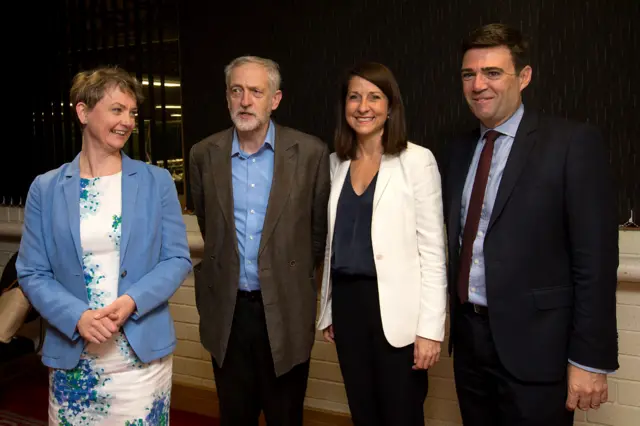 Image source, Getty Images
Image source, Getty ImagesBy about 11:30 on Saturday we will know who the new Labour leader is.
It's been an incredible campaign.
The Newsnight team will be here with updates and analysis from 10:00 on Saturday, and also live-tweeting @BBCNewsnight, external
NEWSNIGHT LIVE LABOUR LEADERSHIP RESULTpublished at 21:24 BST 11 September 2015
21:24 BST 11 September 2015The Honeymoonerspublished at 16:41
16:41How long do Leaders of the Opposition keep their new car smell?
 Marc Williams
Marc Williams
Newsnight ProducerWhoever ends up as Labour Leader at lunchtime on Saturday will be hoping and praying for a quick boost to their party's poll ratings to keep their critics at bay and to prevent a media narrative from developing that the party has elected a dud.
What are the chances of that happening?
I've looked at the poll ratings enjoyed (or endured) by each leader of the opposition since John Smith in 1992 to see how they have fared. I've taken a moving average of the polls to prevent a single poll from carrying too much weight. For each chart below, you will see two lines that intersect at the point where the person becomes leader. Everything above that line represents an improvement on the position they inherited. Everything below represents going backwards from where they took the job.
ED MILIBAND
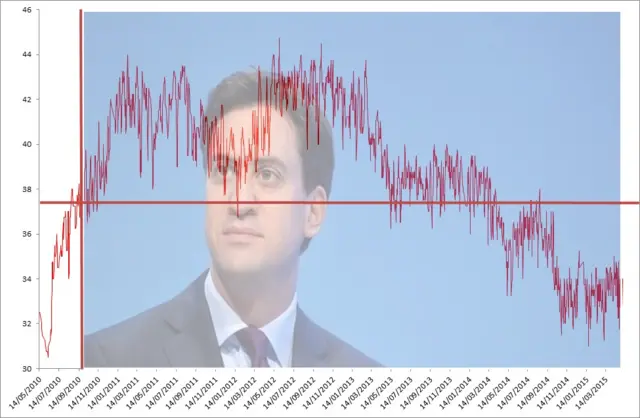
First point to make is that Labour made up a lot of ground after they lost the 2010 election and before a new leader was elected. Part of this is explained by those more left-leaning Lib Dem voters abandoning the party for going into coalition with the Tories.
Second point is that, despite a concerted media narrative that the party had elected the "wrong" Miliband, Labour's poll performance did pick up under Ed. It took until the start of 2012 before the average rating went below the one he inherited. After that point it went back up again, reaching the highest point of the Miliband tenure in the summer of 2012.
It was, however, mostly downhill from there. Around May 2013 he had gone back below the line and, despite another rally, by the end of 2014 Labour were performing well below the levels that they enjoyed when he became leader and close to the levels they were at immediately after losing the 2010 election.
This suggests that, while voters might have agreed with Labour on much of their opposition to what the government were doing, the closer the election came, the more focused they were on whether Labour were a viable alternative. We know what conclusion they ultimately reached.
One additional point that will become clearer when you see the other charts: the sheer density of polling that happened over the past five years compared to prior election cycles. This has the effect that party leaders under fire now face a constant barrage of bad poll news. In another era, there would not have been the sheer attritive quantity of polling to cast doubt on a leader's performance.
DAVID CAMERON
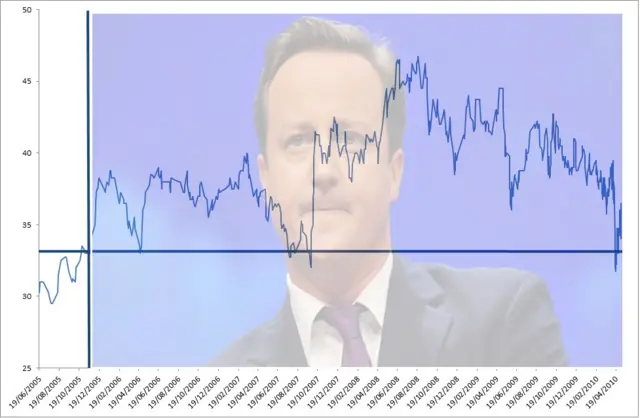
As with Labour after 2010, the Conservatives achieved a bounce (albeit more modest) after their defeat in 2005. David Cameron had a pretty big bounce after becoming leader on the back of a swathe of positive media coverage of him being a different kind of Tory leader.
What is surprising looking back, however, is how short-lived his honeymoon was. By around April in 2006, the gains made by the party under Cameron had all but vanished. He bounced back for a year or so, but the arrival of Gordon Brown in 10 Downing Street presaged a well-documented crisis for Cameron. The cancellation of an early election in October 2008 triggered one of the most remarkable bounces in recent political history.
For months afterwards, Mr Cameron enjoyed a second honeymoon as Mr Brown struggled with, as Vince Cable remarked, his transition from "Stalin to Mr Bean". But what was true for Ed Miliband was also true for David Cameron: the closer the General Election, the more the Conservative poll ratings were squeezed as people weighed up whether they really trusted them to run the country.
IDS AND MICHAEL HOWARD
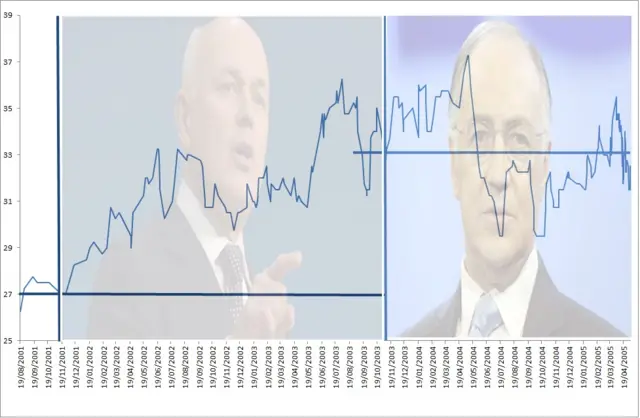
The first of a couple of pairs and possibly the most surprising chart of them all. Iain Duncan Smith is regarded as having been a disastrous leader of the Conservative Party. But looking at the chart above it can be seen that, not only did he steadily increase the Tory Party's ratings but he also never went below the rating that he inherited as party leader. Two caveats: firstly, the Tory Party's ratings at this time were pretty terrible and so improving on them slightly was not the most impressive of achievements. Secondly, he suffered a big crash in poll performance shortly before he was ousted, contributing to a sense that the party got rid of him before he could take the party any lower.
Conversely, Michael Howard is widely thought to have steadied the ship after the IDS period finished. While it is true that the polls did pick up after he took charge, he had a fairly short-lived honeymoon: around seven months after becoming leader he was below the level IDS left him. He then went on to preside over lower poll ratings than IDS had achieved prior to his fall.
WILLIAM HAGUE
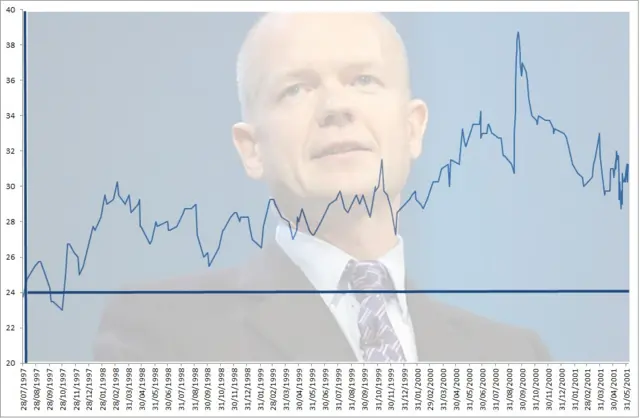
Like IDS, William Hague is not regarded as having been a successful party leader. Like IDS, however, Mr Hague, did slowly improve the Tory Party's ratings from a low base to a slightly less low base.
There was a brief moment at the height of the fuel crisis in late 2000 where it looked like he could break through to win an election, but, in common with most of the leaders under consideration, things petered out as the crunch time of an election got close.
JOHN SMITH AND TONY BLAIR
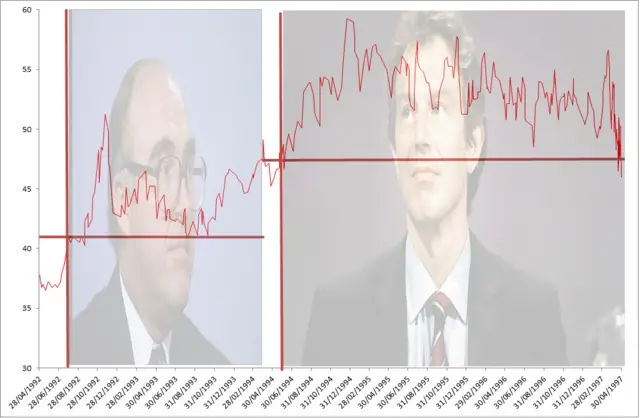
The second pair. John Smith had an unspectacular start as Labour leader, taking a party traumatised by a fourth general election defeat. Black Wednesday and Britain's departure from the ERM gave his leadership rocket boosters by the end of 1992, but, after a year as leader, Labour's ratings were bobbing around the level he inherited. At the time of his death, they were starting to trend upwards again.
The time of Tony Blair as Leader of the Opposition was a golden time for the party, regularly getting above 55% of the vote in polls. Even with Blair, though, there was a dripping away of support as the election neared. Blair's average went below the level his inherited just as the General Election campaign got under way.
LESSONS FOR THE NEXT LABOUR LEADER
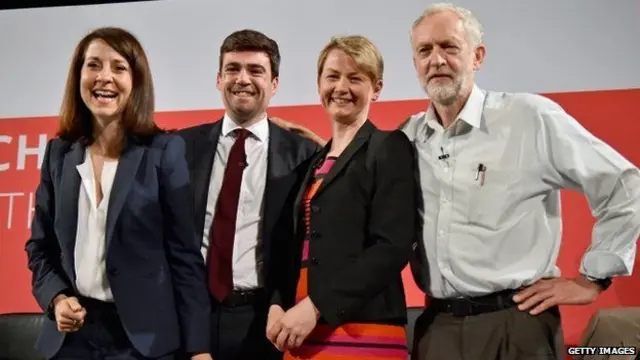 Image source, Getty Images
Image source, Getty Images- You will get a bounce as undecided voters give you a fair crack of the whip.
- The size of the bounce has to be viewed in the context of how badly Labour did at the election. A bounce from 30% to 33% still leaves you way short of where you need to be. Blair had a relatively small bounce, but Labour were already polling in the 40% territory.
- On a related note, improving on what you inherited isn't always enough.
- Get ready for a rollercoaster. Both Ed Miliband and David Cameron experienced near-death experiences and against-the-odds comebacks. David Cameron in particular was probably days away from losing an election and his job in 2008. Leaders of the Opposition can often be given a boost by a timely policy (energy price freeze, inheritance tax break) or a timely event (a Black Wednesday, a Fuel Crisis, an Election That Never Was).
- Build up a big lead ahead of a general election: all of the Leaders of the Opposition considered above who made it to an election suffered a big erosion of their support as election day approached. If you're level-pegging with the Conservatives in Winter 2019, the trend suggests that you're going to struggle come May 2020.
NEWSNIGHT LIVEpublished at 16:28 BST 10 September 2015
16:28 BST 10 September 2015Thursday 10 September 2015
Julian Assange and The Wikileaks Filespublished at 21:09
21:09This YouTube post cannot be displayed in your browser. Please enable Javascript or try a different browser.View original content on YouTubeThe BBC is not responsible for the content of external sites. YouTube content may contain adverts.Skip youtube videoThe BBC is not responsible for the content of external sites. YouTube content may contain adverts.Allow YouTube content?
This article contains content provided by Google YouTube. We ask for your permission before anything is loaded, as they may be using cookies and other technologies. You may want to read Google’s cookie policy, external and privacy policy, external before accepting. To view this content choose ‘accept and continue’.
End of youtube videoWhatever happened to Julian Assange? Yes, he's still at the Ecuadorean Embassy in London. He's been there for three years now. One of the ways he's been spending his time is commissioning a series of essays, which have been put together as a book, The Wikileaks Files. He agreed to speak to Newsnight's Nick Hopkins on that - and that alone.
UK public 'split' over taking refugeespublished at 20:25
20:25According to our poll with ComRes
 Image source, Getty Images
Image source, Getty ImagesSome 57% of people in the UK are in favour of the status quo, or the government taking fewer refugees from Syria and Libya, a poll suggests.
Forty per cent said the UK should take in more.
One thousand people were interviewed by telephone between Friday and Sunday in a ComRes poll for BBC Newsnight.
There were sharp divisions on class and age - with middle class and younger people more favourable to taking refugees.
The poll was an attempt to gauge public opinion after the publication of photos showing the body of three-year-old Syrian boy Alan Kurdi after his family's ill-fated attempt to reach Europe.
NEWSNIGHT LIVEpublished at 20:23 BST 7 September 2015
20:23 BST 7 September 2015Monday 7 September 2015